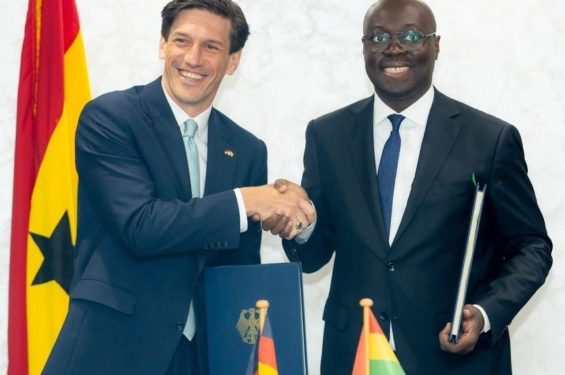Ghana, Germany Sign Sixth Bilateral Debt Agreement Under Ongoing Restructuring Programme
Ghana has signed a bilateral debt agreement with the Federal Republic of Germany, marking the sixth such pact under the country’s ongoing debt restructuring programme.
The agreement follows earlier bilateral deals concluded with China Exim Bank, France, Finland, the United Kingdom, and Spain, as Ghana continues to engage its official creditors under the parameters of the G20 Common Framework.
Finance Minister, Dr. Cassiel Ato Forson, described the agreement as a significant milestone in Ghana’s economic recovery process, noting that it would consolidate fiscal stability and support sustained growth. “This agreement strengthens the foundation of our economic recovery and anchors long-term progress,” Dr. Forson stated.
He expressed appreciation to the government and people of Germany for their continued partnership and confidence in Ghana’s future, stressing that the agreement reflects the depth of cooperation between both nations.
German Ambassador to Ghana, Frederik Landshöft, commended the Ghanaian government’s progress in stabilising the economy and reaffirmed Germany’s commitment to strengthening its bilateral and economic cooperation with Ghana.
The deal with Germany comes shortly after Ghana concluded a bilateral debt restructuring agreement with the Kingdom of Spain — the fifth such agreement under the country’s Official Creditor Framework. That agreement was signed by Dr. Cassiel Ato Forson on behalf of Ghana and H.E. Ángel Lossada Torres-Quevedo, the Spanish Ambassador to Ghana, on behalf of Spain.
According to the Finance Ministry, these agreements form part of ongoing efforts by government to restore debt sustainability and reinforce the foundations of economic recovery.
On the back of Ghana’s successful debt restructuring programme, global ratings agency Standard & Poor’s (S&P) has upgraded the country’s long- and short-term foreign and local currency sovereign credit ratings to ‘B-/B’ from ‘CCC+/C’, with a stable outlook.
S&P cited improvements in fiscal management, external balances, and overall economic performance, and raised Ghana’s transfer and convertibility assessment to ‘B-’ from ‘CCC+’, reflecting growing confidence in the country’s capacity to manage foreign exchange flows and external obligations.
The agency attributed the upgrade to Ghana’s strengthening balance of payments position and gradual fiscal rebound, supported by sustained economic growth and favourable global prices for gold and cocoa, which together account for more than 60 percent of the nation’s exports.








